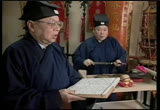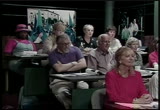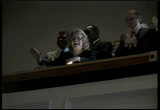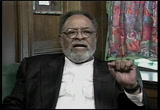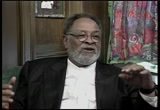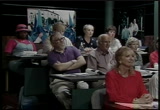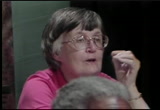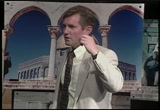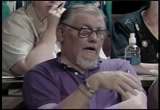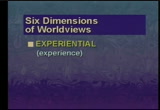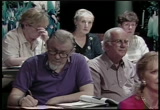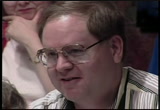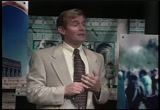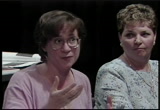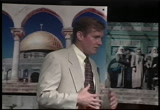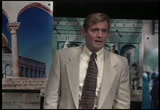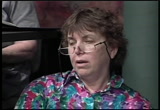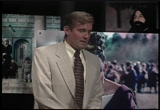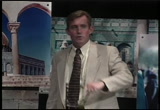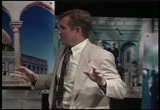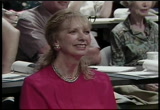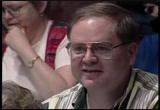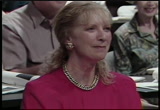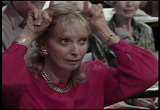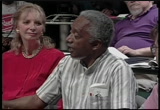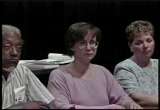tv Al Jazeera World News LINKTV February 7, 2013 7:00pm-7:30pm PST
7:00 pm
welcome to another session of beliefs and believers-in fact, our second session. i think our first class went extremely well and we began to explore a number of very important class themes, pervasiveness of religion, identity and relationship, and we'll be looking at that. i wanted to go to a roll-in, though, that we didn't get which is one of the more interesting ones we have at glide memorial methodist church out in san francisco. and this is, in a way, i think a little synchronicity here. maybe it's good we didn't get it in the last class because it's a good way to prompt some of the questions you might have
7:01 pm
about some of those key class themes we went over in our interview with cecil williams. now, this was quite a shoot. it's a fantastic church out in san francisco, and reverend williams said some amazing things about religion on this. but for the crew, what made the day, actually, it was my birthday - i went to church on my birthday when we did this shoot, and it was chaos. i mean, thousands of people around, nobody knew where we were supposed to go, we're sitting down with all our equipment like some rock stars on a battle of the bands, hanging around there, just waiting for stuff to happen. and all of a sudden, this movie star walks in - what's her name? anybody know her? tall? see, i forgot her name already. but she walks in and just - she's got this beautiful look and it made the day, anyway. but we weren't allowed to get her on tape there. anyway, that has nothing to do with religion. but what we want to do is to look at this tape here,
7:02 pm
and thinking about identity and relationship and religion, here we have cecil williams, reverend cecil williams, who's quite a character, has a very diverse, incredibly lively, incredibly experiential church out in san francisco. and this is just a short interview, but jot down some things about what he has to say about religion, and maybe while we're looking at it, i can remember who this great actress was who, obviously, had such an important impression upon me. so with no further adieu, let's look at cecil williams at glide memorial methodist church. ♪ gospel music and singing
7:03 pm
>> be careful about religion, because religion can be toxic. and what we have to do is we have to make sure that when we say we are religious people, that what we're really talking about is how we can live our lives with others in ways that they don't suffer as much. there's pain, all kinds of pain, but those who have less have more pain, and have more - they're limited more,
7:04 pm
because we make sure that someway, somehow they're always having to look for food, look for money to get some clothes, look for a place to stay - they're always looking, they're not getting very much, because they have to look so much and so on. and so i think the critical thing is how can we make things work on earth where people will know - that the church, for instance, that is out in the forefront. martin luther king calls it the drum major. you've got to be the drum major - leading the band, the march, the parade. but what is the church? it's the tail light on a car - it's just always behind. and so i think what we must do is turn things to a point where we come to understand that you cannot have a new heaven until you have a new earth.
7:05 pm
>> i love that line, "you can't have a new heaven until you have a new earth." it's like that line, "why are you worried about life after death? let's worry about, life before death" - that kind of thing. sharon stone - that's who the actress was. the reason it took me a while to remember is she was at church and so her skirt was a lot longer than it normally is, on the thing. but anyway, back to reverend cecil williams. comments and thoughts relating back to the previous class about what he's saying about identity, relationship - did you catch anything in there you wanted to comment on? sure, chris? >> he was also talking about power. and for him, he wants to use the church's power - at least from what i got - to be at the forefront of social action, and that's how believers are expressing their beliefs, through social action, and i think that's what he was talking about the power
7:06 pm
of the church to either be toxic and be bad, in a way, and be detrimental to society, or the power of the church to be a motivator, to be a positive force, and for good. >> you're so right, and we'll talk about that with the social dimension. but you see, belief and behavior, he fits in that mode so much. i love this analogy he did - and his church is very diverse, very diverse - he says everybody's invited to the table. jesus invited everybody to the table and they're singing and they're clapping and you get that sense of, "yeah, we all belong here." and as you're saying, it's the commitment to social action. now that's not going to be for everyone, because we're going to look at the contemporary traditions and mystical traditions, and there's other ways one can go about being religious. but yeah, i think that's what it's getting at. yeah, leonard? >> the first thing i thought about when they talked about toxic religion and he talked about toxic religion was fundamentalist christianity,
7:07 pm
which is what i started, and it was with the missouri synod. because we were all so focused on the future of after we died, and not that much on what was going on on this earth, and how to enrich our lives, and we had those big thick walls not letting in buddhist thoughts or anything like that, and i just found it - instead of life-affirming, i found it was life-denying. >> but do you see in there also how we're right at that nitty-gritty? i mean, i didn't want to just shove that identity and relationship thing down your throat. i mean, can we begin to see that, that's what we're talking about here, is how people form those? oh, sure. >> i was very impressed - well, i won't say that - i was struck by the emotion. most churches are quiet, most churches are ritualistic. the emotion - the people who would, in everyday life, pass each other up or so forth - they're there together, and they're letting all this tension out.
7:08 pm
this is cathartic for them. >> it was so amazing to be there. i mean, oftentimes they were waiting for us, so we didn't know when we were going to get to interview them. so i said, "the hell with it" - i guess i didn't say that; it was a church. but i went out and said, "well, i'm going to sit through the 11:00 service", and i loved it! the singing, and it was packed, it was hot, but that emotional, experiential thing that you felt there was very, very cathartic - it's a way of releasing those kinds of tensions and feeling spiritually renewed. and we'll come back to cecil later in the course, but i asked him very up-front, "what's important to you, religious doctrine or religious experience?" and he's very hard on the experience. he says, "yeah, experience. we've got to get people feeling, and then the belief part will take care of itself." now, not everyone will agree with that, obviously, but it really works there, and my goodness, there was three services and they were all just packed
7:09 pm
with the singing and the choir and everything like that. yeah, janet? >> to tie back into what we talked about in the first class with relationships - he said "live lives with others so they won't suffer as much." which i thought was a very clear statement of compassion, and he talked about those relationships. >> yeah, and he's very untoxic about how he goes about it, and we have, again, some very nice further interviews. oh, warren, you had a comment? >> i thought he put his finger right at the crux of the problem in most religions - right belief as opposed to right action. and i think jesse jackson said it about as appropriately as any - he wasn't going for the ham, or for the pie in the sky, or for the ham that am. and i really kind of think that's been, i don't know, somehow diverted in modern america-christianity. >> yeah, and i think we'll see that in a lot of religions. again, the beliefs and believers connection.
7:10 pm
i want to switch gears here, because i think we're getting rolling here on this idea of looking at religion. i want to talk about the six dimensions of religion, which is going to be the structure for our course, and appropriately, in our second class, we'll be looking at those as somewhat arbitrary structure, but ninian smart created the six dimensions of religion, and i found it very effective in looking at that. well, let's go through the six dimensions, and then we'll show a little piece on the mount of beatitudes, and we'll be able to come back and see where they come from. we're really moving through the course, and the first one we're going to look at is the experiential dimension - religious experience - and we've talked about that, how the idea of boundary questions or profound life questions - well, these engender religious experience and so we'll be looking - that's our first dimension, and we'll be looking at different kinds of religious experience and following it on from there. the next would be myth.
7:11 pm
in religious studies, not false stories, not untrue stories, but profoundly true. maybe not scientifically provable, maybe not common-maybe it defies common sense - but to the believers, these are the profoundly true original stories, and we'll be looking at those. one interesting facet, we'll look at the six dimensions hanging together here, but the kinds of boundaries questions that rise up in the experiential dimension - who am i? what's my relationship? well, guess where the answers to those questions come from? they come from the great stories of the original religious leaders. think about the bible, for instance - the story about what jesus originally did with his followers. that's the great story that then, ritually, we repeat - christians repeat, in terms of baptism and other ceremonies. so we experience some mythic and ritual.
7:12 pm
the next one will be religious doctrine. we've already talked about doctrine, but the doctrinal dimension is, well, where we could get a little bit more tense. this is where people believe, this is where people hold onto a certain statement. and we've already discussed that somewhat in class, but we're going to come back to it time and again. comments on doctrine, or anything? yeah, sure, leonard? >> yeah, i do believe, again, that there could be toxic doctrines or there could be life-giving doctrines. and again, i go back to that man that we're going to come back to from the methodist. it does make a lot of sense to take care of the people who are suffering on this earth, instead of just going around and evangelizing asking people, "well, if you died today, would you go to heaven or hell?" and it's like, well, if they're starving, does that really matter? >> yeah, and so how do we - doctrine is so necessary, because we'll see doctrine brings order to myth and ritual-these great symbolic stories or these great rituals - doctrine brings order to it, but at what cost
7:13 pm
do you block people out? and so we want to be very careful about that. but doctrine is a very key, important dimension, and we'll be looking at that as we move on through the semester. ethical dimension - anyways, doctrine and ethics is the very heart of the course because doctrine is belief and ethics is behavior. and so that's where we really get down to the sociological look at this course - as people believe, so they behave. and so as we move through the course, how i like to do it is we'll first look at the experiential dimension, and then we'll see how experience, myth, and ritual join together or hang together. and then we'll look at doctrine and ethics-as people believe, so they behave. and finally, at the end of the semester, we hit the social dimension and bring it all together and see how the previous five dimensions combine to make a complete picture, and that's the power of religion out there. so that's the basic structure that we're going to be using.
7:14 pm
now we went through that rather quickly, so let me just check if there's any questions you might have on any of the dimensions here. are people comfortable with myth? sure? >> well, as people believe, they do not necessarily behave. >> that's a good one. >> i mean, if people behave the way they believe, this would be a messianic world. >> you're exactly right. that's another one of these reality checks that you need to have in here, because how true with religion. janet? >> is it a profession of a belief or really a belief? >> yes. >> i think there is maybe where that issue lies. if it's truly a belief, then it would manifest in behavior, but if it's just talk, there's a difference. >> yeah, we were talking on the break. i mean, should religions be nouns - like "i'm a christian," or "i'm a muslim"? it's more like, "i'm christianing," "i'm musliming,"
7:15 pm
if you could go that way. it's more like a verb; it's something that you should apply in your life in order to be authentic. and we all know that there's an inevitable element of hypocrisy in religion, because how can you live up to some of these great, great standards, it's so true. yeah. >> i'm wondering, for people who are seeking, do they choose a religion that goes with their beliefs, so that they have something to substantiate what they feel inside? or do they feel a lack, and therefore, they go to that religion, hoping it will teach them? i think it's the former, that they look for something that will conform with what they have in their own selves. >> i think you're so right, and we're going to talk about different styles, including the seeker style of religion. but that's really quite true. i'm going to get myself in trouble here for being facetious, but i was sitting around in grad school, and we thought we could make a bunch of money by - you know how you have dating services, where you meet people? well, we were going to link
7:16 pm
people up with a religion that fit them. that was the point - "now, you tell us what you believe and what spiritually excites you, and we'll get you a religion." but it's something along those lines, and we'll talk about belief style and seeker style. and my experience is that just about everybody, no matter how doctrinally grounded you are, you scratch a little bit, and there's a little bit of a seeker in every religious people, and how could it be any other way? it's almost like a genetic imprint - we're just slightly different, slightly more evolved or less evolved, and the religion that we take on we still seek within that. so it's a very good point. and our six dimensions is a way of seeing how people go about doing that seeking. sure? >> under the doctrinal category, i think it's real critical as to whether your doctrine frees you or imposes limits on you
7:17 pm
in terms of the power we were talking about. >> yes. and so often, religion - not just individually, but collectively - can drain you of power, if your doctrines don't allow you to grow. is that sort of where you're headed with that? >> i'm thinking as a woman, many of the doctrines have kept us down - subjugated us, in the name of religion, which has been damaging to half of the world. >> and there is a perfect identity relationship example - we live in an androcentric, patriarchal culture here in the west, and those kinds of man-centered
7:18 pm
focus on divinity, on god, has indeed hurt the self-esteem and empowerment. that's another thing with identity and relationship that we'll get into-identity is about self-esteem; relationship is about empowerment. and your very astute observation, we have certain doctrinal slants, particularly in judaism, islam, christianity, but on the other religions, too, that hold the male up as the only authentic figure in which one can develop a sense of self-esteem and empowerment, and that indeed has caused damage, has hurt women. so these are the kinds of things we have to think about - good point. sure? >> for myself, i'm just looking this over and i see all of my own inner conflict in all of the categories. i'm a catholic. i believe in the myth; i appreciate the ritual. then i get over to doctrinal and ethical and i think, "hmm," this is where i have the problem.
7:19 pm
i cannot take everything the pope hands down - the doctrine, the ethics - i cannot behave - in an opposite way, the way she mentioned, i cannot behave the way my religion tells me to. if i wanted to get a divorce - well, i could go on down the line of all the things that are handed down. i've often thought, "gee, i wish there was an american catholic church, that would take on..." we could go on forever. but i'm just saying, i'm seeing all of my own conflicts in these categories. >> but you see - and this is something, when we get to the social dimension - this is what spawns new religious movements when you have religious freedom, because someone is going to say, "i can't live that doctrine; i'm getting up out of this pew and i'm walking down the street, and i'm going to either start my own religion or i'm going to join another one," and that's the interesting dynamic there of how we're getting into this thing. we'll get to you in the back there, because we haven't talked to you yet. >> well, this kind of gets back
7:20 pm
to the gentlemen's comment, "beware of the charlatan." i wonder what the second jew would have said about that, or the second christian, or the second zoroastrian. religion, it seems to me, is a decidedly unsafe subject - it's not a place where people tread without the danger of what they might find when they seek. and i think as a result of that search and of that seeking, we're just profoundly putting ourselves in danger, but that's part of the seeking. >> that's - again, i feel like throwing these notes out and just listening to you folks. you're so wise. i mean, that's a great point, because what you're saying is that this seeking when you're getting down to something as fundamental as identity and relationship, there's an element of danger, because you just might find,
7:21 pm
and the dynamic of different people seeking in different ways, rubbing up against each other, as we well know, does indeed create a certain amount of danger. and i'm with you. i mean, i make a living teaching religious studies, and i'm flat out amazed that i get away with it as easily as i do, because it annoys people - people would just as soon stay away from it or keep it in their own domain. and of course, what we're trying to do in this class, and it's just wonderful to bring up in our introductory segments here, is we are doing something a little bit radical. and as you know, this will be a teleclass and we're all in this together, so you might want to have your phone numbers changed. but it is a little bit radical to try to develop some sort of neutral criteria, which is our six dimensions for even entering into this kind of discourse, this kind of program. and it's not without its dangers, not at all -
7:22 pm
it's a good point. yeah, leonard? >> it's interesting. i have done some seminary studies at the university of chicago and some of the surrounding seminaries, and what this woman said, i think there is going to be an american catholic very soon organization. there's already two organizations that they're already trying to get themselves organized, and i think it's good because there's more of a feminist ethic here - it's more developed in america than it is in other countries. >> and what do you do with that? one side, the traditional side, says, "well, you're just excommunicated; you're going to hell. have a good time." the other side says, "no. there's an authority here in which i want to break the doctrinal boundaries. i still love the myth, i love the ritual," and we so often here that in the high church religions there, but there's a great love for the story, for the ritual. but you hit the doctrine, and you hit the ethical thing, and you notice how we were talking here about the beautiful art and architecture-myth,
7:23 pm
ritual, and experience tend to be the beautiful inward - turning dimensions of religion. but, not to put them down - but doctrine, ethics, and the social dimension is the outward-turning one, where we get the friction, the tension, the structure, and unfortunately, boy, as we saw over in the middle east when we visited, even potential disasters and death, so it's pretty heavy stuff. yeah, sure? >> and also, for women, i think it is hard for them to have that in turning, because for most of the religions of the world, it's male-oriented, and i can say this as a recovering fundamentalist, or a missouri lutheran person, that we weren't even allowed to have women pastors in the pulpit, and i think that just changed like last year, and women couldn't vote in the church, and i didn't see it as a problem at the time, but i see as a female, you're getting all these messages you're second class - that's not good. and again, to bring it
7:24 pm
back to our key class theme, and your comment that you brought up, i think is very helpful with this, that we are talking about identity and relationship and religion has to be authentic. i mean, there are other ways you can be religious. there's the belief style and people hold onto their religion because they just have to hold onto those beliefs. there's the communal style - you're born into it, so that's where you are. but there's also that seeker style when it just isn't working, and we want to look at that, and get some handle on that. fire away. >> i just wanted to say he blew my cover, i'm a catholic. >> well, he's a recovering fundamentalist. one day at a time, larry, one day at a time. >> but i am and i'm happy with that. but i think, before the cameras were running and we were all talking on another occasion, i referred to my faith home as a part of a monolith - that's how it's perceived, the catholic church is, but it's far from that. among other things, i am a divorced catholic,
7:25 pm
and i'm on the board of directors of the north american conference of separated and divorced catholics - that's supposed to be an oxymoron. but we're here, and the church as a very compassionate and a vital ministry for these people, and does accept us back - you don't have to leave. lots of people think you do. but it's not necessary; it's not asked for. and then i also found out, through this kind of work, that catholics aren't the only ones - it's not like divorced people were every really welcome in any other faith home. and many other faiths have used the kind of ministry that we promote in their own church homes, by way of getting over this, and we just blend into the scenery, because we don't really have horns. >> i find it absolutely amazing the range of beliefs that some religious adherents believe. my first wife was working at a factory where the driver
7:26 pm
of the owner was a muslim, and the owner told him to take the ladies to lunch one day. so they got in the front seat of the car and closed the door, and the driver jumped out, and he said that he was taught not to sit on the seat with women - he couldn't do it. and these kinds of beliefs - i like the word toxic-to me, it's just amazing. and i'll go a step further and i'll say that we go too far - it makes no sense to me, what he was taught. and so i went to a catholic university, depaul university, and not being catholic - i was raised a baptist - i had some trouble with the infallibility of the pope's concept - i couldn't buy it. i guess i was looked at with strange looks, but to me, it's just personally amazing.
7:27 pm
and i'll go a step further, still, in discussing cults. hundreds believe -y, i'm just flabbergasted. >> we will see some things in this class that are truly extraordinary, and that's a real test. i don't want to muddy the waters, if that's correctly mixing the analogies here, but there's some extraordinary things where we go and talk to these believers, far out stuff, very far out - but they're intelligent, professional people, and they're into this. it's astounding. chris, let me get to you, and then we'll have to shift gears here or i'll never get through this. >> i was just wondering, maybe religion isn't so much about god, and maybe it's more about people, and the way they perceive their surroundings and what god is to them. maybe that's what religion is all about - maybe it's about the different people. and i guess that's really the focus of this course is looking at the people instead of just the doctrine.
7:28 pm
>> you're so right, chris, and it really is the focus of the course. and i love the comment about the danger involved here and we should be up front about this, right from the first classes, because indeed, we are wandering through different people's lives and we're listening to real believers and we're trying to make sense of them best they can. but it is about people, it's about human beings, this extraordinary human creativity that is almost like no other, but spawns the most beautiful art and architecture and music, and at the same time, spawns the most horrendous kinds of violence, power - i mean, that's really where it's at, and that's what gets so exciting, from a beliefs and believers perspective. it's a kind of course you could just throw it out the door and say, "that's a waste of time because i didn't get a truth out of it." but the truth is the believers, and what we're going to see and what we're going to experience as we go through that. and from a humanities perspective, that in its own right
7:29 pm
is worth the time, because it's an extraordinary story that we're going to see. i'm glad you brought that up, because basically, the six dimensions are - it's our vehicle, it's our way of going about it. it could be two dimensions, it could be four dimensions. we're taking the six because it's an open-minded structure that we can lay down like a grid on any world view at the end of the semester and see, "well, how does this come to be? how does this pull into reality?" now i want to do one - now we've got a couple really interesting - more roll-ins in here, and to kind of show you how, let's go back to the beginning, to an initial mythic, experiential, ritual activity, and in this case, it's christianity. we did go to the middle east and it's - i think i've said that a few times - under great peril, too, because it was at a rather touchy and dangerous time.
47 Views
IN COLLECTIONS
LinkTV Television Archive
Television Archive  Television Archive News Search Service
Television Archive News Search Service 
Uploaded by TV Archive on

 Live Music Archive
Live Music Archive Librivox Free Audio
Librivox Free Audio Metropolitan Museum
Metropolitan Museum Cleveland Museum of Art
Cleveland Museum of Art Internet Arcade
Internet Arcade Console Living Room
Console Living Room Books to Borrow
Books to Borrow Open Library
Open Library TV News
TV News Understanding 9/11
Understanding 9/11